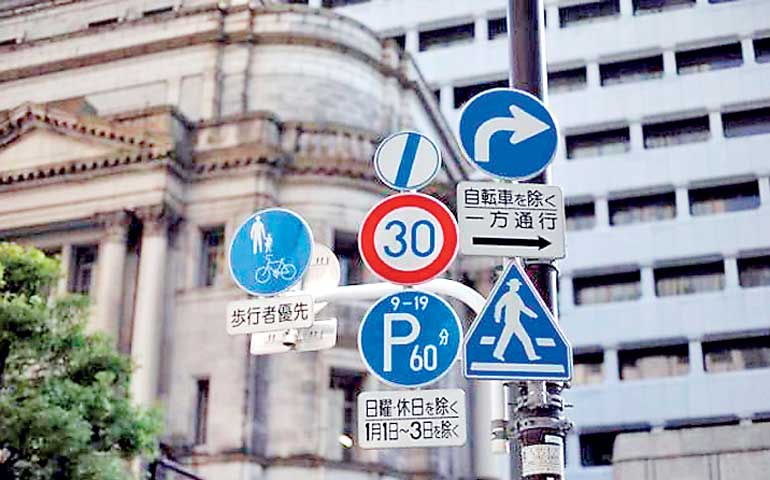Saturday Feb 21, 2026
Saturday Feb 21, 2026
Friday, 30 October 2015 00:00 - - {{hitsCtrl.values.hits}}
 Traffic signs are seen in front of Bank of Japan (BOJ) buildings in Tokyo
Traffic signs are seen in front of Bank of Japan (BOJ) buildings in Tokyo
TOKYO (Reuters): The Bank of Japan is expected to hold monetary policy steady on Friday even while diluting its rosy inflation forecasts, sources say, clinging to the hope a tightening job market will underpin consumption and help the economy emerge from a soft patch.
Some BOJ policymakers have worried that sluggish demand in emerging Asian markets could hurt output and corporate sentiment enough to delay planned capital investment and wage hikes.
But Thursday’s data showing a healthy rebound in output has eased pressure on the central bank to use its diminishing policy ammunition now, analysts say.
The BOJ is likely to stand pat with financial markets stable and no clear evidence yet that overseas headwinds are damaging corporate sentiment, say sources familiar with its thinking.
“Corporate activity remains firm for now and a positive economic cycle is intact. The key is how overseas headwinds could affect all this,” said one of the sources.
At Friday’s rate review, the BOJ is expected to maintain its pledge to increase base money, or cash and deposits at the central bank, at an annual pace of 80 trillion yen ($663 billion) through aggressive asset purchases.
Glimmer of hope
Japan’s economy contracted in April-June and may shrink again in July-September on weak exports. Many analysts say any rebound in the current quarter will be too weak for the BOJ to achieve its 2% inflation target next year.
With the economy skirting recession, the BOJ is expected in a twice-yearly report due on Friday to cut its economic and price growth forecasts for the fiscal year that began in April.
But sources say the BOJ will only slightly tweak its forecast that inflation will hit 1.9% next fiscal year, giving it grounds to argue that Japan can hit the 2% inflation target without expanding stimulus.
A recent Reuters poll found economists are split on whether the BOJ will pull the policy-easing trigger. Some bet that despite his optimistic tone on the economy, BOJ Governor Haruhiko Kuroda may surprise markets by easing, as he did in October last year.
BOJ officials have said economic conditions are much better than last October, when consumption took a direct hit from a sales tax hike, and companies were in no mood to raise wages.
When excluding the downward pressure from lower oil prices, consumer inflation is accelerating as more companies say they feel comfortable about raising prices.
Markets have shifted their bets more toward no action after a string of positive economic data this week.
Factory production rose 1.0% in September after two straight month of falls, data showed on Thursday, as robust U.S. and domestic demand for cars and cosmetics made up for weak machinery demand in China.
Output is seen rising roughly 4% in October-December after two straight quarters of declines, underscoring the BOJ’s view the economy will stay on the moderate recovery track.
“The output data was not that bad, so it doesn’t give the BOJ justification to ease,” said Taro Saito, senior economist at NLI Research Institute. “I doubt it will use its precious remaining options now.”